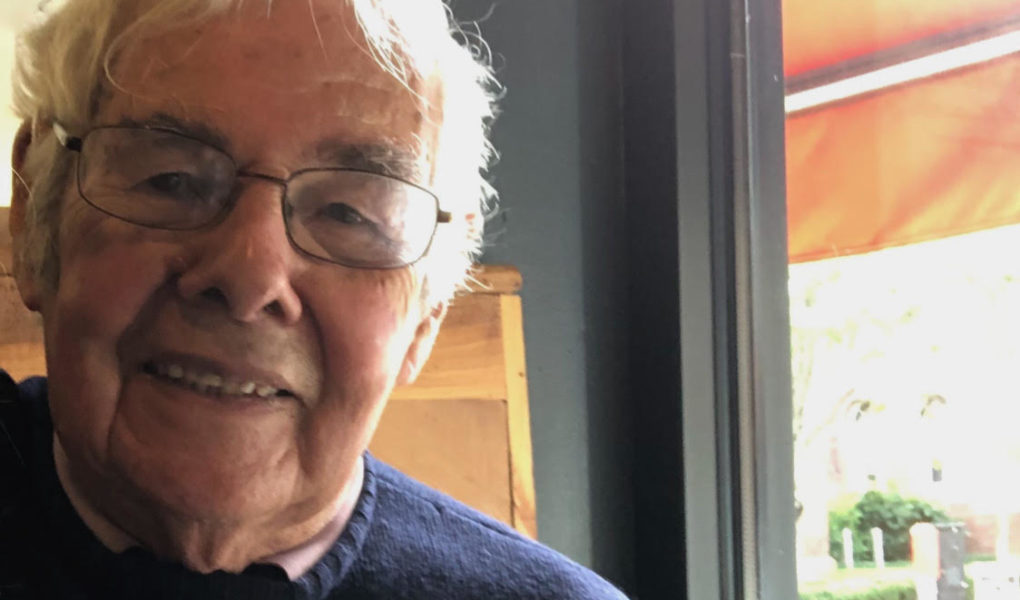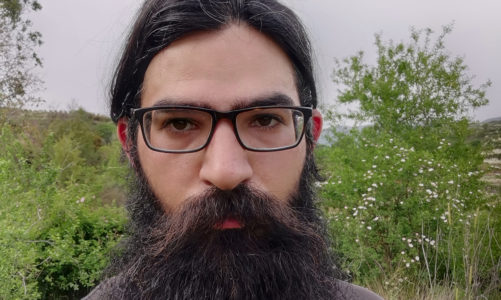
Barrett Hazeltine is Professor of Engineering Emeritus at Brown University who has officially retired twice but continues to teach a full course load. Hazeltine also advises senior thesis writers, oversees independent study projects, chaperones international trips, stewards research, and bikes to and from work every day as he enters his 62nd year of teaching at Brown. He served a twenty year term as Associate Dean of the College from 1972 to 1992. Hazeltine received a Master’s in Engineering from Princeton University in 1956 and a PhD in Philosophy from the University of Michigan in 1962. In 1965 he entered the Space and Information Systems Division of the Raytheon Company as a participant in the ASEE Residencies in Engineering Practice Program. He then went on to help found engineering programs at the University of Zambia, University of Malawi, University of Botswana, and Africa University in Zimbabwe.
After he was chosen for the Brown Senior Class’s prize for excellence in teaching 12 consecutive times from 1972 to 1984, it was renamed The Barrett Hazeltine Award for Excellence in Teaching in 1985. Despite this, by popular demand, Barrett Hazeltine won The Barrett Hazeltine Award for Excellence in Teaching again in 1990. There is also the Barrett Hazeltine Entrepreneurial Mentorship Award, established by alumni who founded prosperous businesses as a result of his guidance through the years (including Tom Scott ’89, read our interview with him here.) At his most recent retirement ceremony, the Division of Engineering renamed their main vestibule “Hazeltine Commons.” Professor Hazeltine now passes through it every day on his way into work.
Amelia Spalter: What did the engineering programs typically look like when you’d first arrive at a newly founded university in Africa?
Professor Emeritus Barrett Hazeltine: We went to the University of Zambia first, in 1970, and it was just a very British university. The curriculum was all British, they had a British external examiner. On the one hand, engineers were needed to upgrade the local infrastructure. So, their education couldn’t diverge too much from the British, because they were going to be using equipment that was made and designed in Britain. On the other hand, there were no Zambians on the faculty. So, the curriculum didn’t match a lot of the students’ needs. There were basically two economies in Zambia at the time. One was the mining economy, which was not really state-of-the-art; the other was the local economy, where people didn’t have electricity in their homes and even firewood was scarce. So, at the time the engineering program had absolutely nothing to do with the local economy. It prepared people to work in the mining companies, although I don’t think very well. It didn’t prepare them to be design engineers or things like that. They were basically trained to fix the machinery and keep it up to date. Malawi was the same thing, except instead of mining they had agricultural processing. There were just a few Malawian engineers, but the university was already making some technological improvements and hiring people from in the villages. Then we ended up in Zimbabwe, which was a private university. The engineering curriculum also focused on agriculture. Zimbabwe was beginning to pay attention to how to make life better for the people in the villages.
What are some of the most notable changes to these engineering programs since you first began teaching in them?
When we were in Zambia, there were no Zambians on the faculty; the only Zambians I’d see when I lived in faculty housing were assistants and staff. When I returned to visit in 2007, we were the only Europeans in the housing compound. Before, most of the faculty had been trained in traditional engineering and were a little bit at a loss as to how to be useful in local conditions. But I recently got an email from a student I’d taught in Malawi and he wrote to tell me he’d gotten his PhD and eventually became head of the electrical engineering department at the University of Malawi. He taught there until the mandatory retirement age of 60, and now he’s head of the power company. Some schools now have centers of alternative energy. People say this all the time, but I think the big shift is going to be soon. It gets into all sorts of, almost, philosophical problems. You know, “Do you want to follow the rest of the world in your technology planning, or do you want to go out and start your own direction?”
The other issue that was important, especially in the beginning, was decolonization of the mind. When we first went to Zambia, the aspiration was, “We want to be as good as those British universities,” but being as good as those British universities meant being just like them, and in an entirely different setting. Senior faculty who had trained abroad didn’t want to make their institution very different from British universities, because they wanted to show they were just as good. And of course, that’s a vain hope, you’re never going to be the same as Cambridge or someplace like that. The sooner you find your own direction, the better off you’re going to be.
When did the universities begin to hire more local professors than foreign ones?
It was gradual. As the Europeans got older and left, there were local people coming back from graduate work that took their places. There wasn’t tenure then, so after your contract was over, it wasn’t that difficult to replace people. [My family and I] were in Zambia three times, 1980, 1984 and 1988. It was very gratifying to return in 1988 and see what had happened to the people who’d graduated from that very first class. Not only were some on the faculty, but somebody else was running the telecommunications department and somebody else was in charge of indigenizing the infrastructure, there were many great opportunities. A lot of African engineers returned even from the United States, because they saw those opportunities that hadn’t existed before. I think going back was already attractive because, while most people won’t admit this, all most people really want is challenging, engaging work where they really are convinced they’re doing something good. Salaries are much higher in the US and there’s more technology available, but there are an appreciable number of people who will put up with those constraints if they feel they’re doing something worthwhile. They just hadn’t had the opportunity in the past.
You mentioned you feel the “big shift” is coming soon for these programs. In a perfect world, how would you like to see that manifest?
I’d like to see universities where a whole lot of the curriculum is focused on making life better in the villages and putting in an economic infrastructure like roads and electricity. Like trying a micro-grid model for electricity. Developing small-scale water purification so that every village gets year-round access to clean water. Trying to develop agricultural tools specifically applicable to the kinds of farming being done locally. Just solving problems unique to the community. For example, if you don’t want to put down cement-paved superhighways, how can you make gravel roads better? Recognizing that we can’t and shouldn’t be making all things the same and there is no reason to be a lesser cousin to European companies and ideas. More of that is needed and I think more of that is coming now.
Has China’s growing influence impacted the engineering curriculums?
My wife was born in Beijing, so we’ve always paid attention to China. When I was in Zambia and Malawi, there were clearly Chinese projects, but you never saw Chinese people. It was very curious. Some of the technology that’s come out of China is very strong, especially in the public works, but I don’t know if they’ll really be used in a lot of African countries. This big push into China surprises me, because at the beginning of the years we were in Africa, the African countries were nationalizing a whole lot of their foreign investments. I think that is what could happen to the Chinese people they’ve got working. Chinese managers will build diamond mines and all of a sudden, they’ll go in one day and will be told, “Well, thank you, we appreciated your building, goodbye now.”
What did you miss most about Africa after returning to teach in North America?
I think it was that sense of opportunity, working in a place where you saw that change was going to come. When working at a university that’s two or three years old, you feel potential to have some sort of impact. It’s very hard for anybody to make a major change to Brown. These were very small universities, so you’d talk to a lot of students who were realizing all of a sudden, “This is my country and I’m on a path to being in charge here.” The whole milieu was very exciting.
What could Brown be learning from African universities?
I certainly learned a lot of technology things. I was introduced to technology I never would have seen if I had stayed here as an ordinary electrical engineer. It gives you much more appreciation for the impact of technological and societal change. I had to think through very basic things like, how do you heat a room without a central power source or fireplace? How do you clean water? It was a very different set of circumstances from “How do I use these little pieces to make a radio?”
You’re a successful inventor who has worked with, taught, and mentored many other prominent figures in the field. Was there any defining characteristic they shared besides having good ideas?
Ideas are really very common. Finding the correct implementation of an idea is the real business. I think the cliché is right: useful inventions come from understanding a product and understanding a need. Life-changing inventions come from people who are willing to invest time and effort. There is a temptation for people who are technology-trained to find a solution and then look for a problem that fits it, or to focus on the problems that are already getting a lot of attention. But to really make a difference in people lives, you’ve got to be somebody who’s willing to invest a lot of time in understanding what the real problem actually is. It’s like the Abraham Lincoln quote, “Give me six minutes to chop down a tree and I’ll spend the first three sharpening the axe.”
Has the increase in market share of large corporations made it more difficult for inventors to launch ideas independently?
Actually, it’s gotten a lot easier now. One could argue it’s almost gone too far, because investors are willing to pick up any good idea whether or not it’s profitable, just because it could maybe be great, someday. Small can be beautiful, but small is still small. You’re going down a different street, one where the road to having a big impact on the market will be longer than with a large company behind you. But even as an employee, there is new opportunity for people who feel they’re being stifled to do something about it. Although many engineers work for large companies, they don’t work for the same large company. If somebody who is in a large company feels she is being stifled, she doesn’t have to work there another 30 years, she doesn’t even have to work there another 30 days. There has never been more opportunity for people in big companies to go to their manager and say, “Look, unless you give me something exciting to do, I’m going to go off and work somewhere else or do a start-up.” That wasn’t as easy 20 years ago. Twenty years ago, if you worked somewhere like IBM, you did it IBM’s way until you retired.
If one of your students said, “I’m about to graduate and I have a job offer from a big firm, but I’ve also got a promising start-up idea, and I’m not sure which to pursue,” how would you advise them?
My first view would be, if you’re 22 and you don’t have a mortgage, a car, and a family to support, then go do the start-up. It’s going to be much easier now than at any other point in your life and I think it’s more exciting. But I could be wrong. Maybe you’re better off going to work for IBM or Amazon or something like that to learn how a big company functions, then go ahead and start your own thing. The number of entrepreneurs over 40 is quite large. The other advantage of course is that if you’ve had some time to get good, you’ve probably got some money in the bank and are better able to start something. But I still think it’s more fun when you’re young. Many people who are over 40 have responsibilities where it would no longer be fair to totally commit themselves to a start-up. At 22, the pace of start-up culture is exciting. At 40, it’s nice to be able to come home at night and have dinner with your family.
*This interview has been edited for length and clarity.





Really a topic that deserves to be republished, and I personally like to follow your site because I do not feel wasting my time in it. I will share the topic on my account on Facebook, Twitter and Linkedin